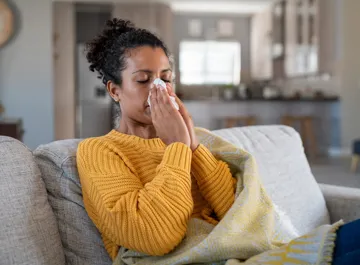
The flu vaccination
Royal Voluntary Service and the NHS work together to encourage people to get flu safe with a flu jab from their GP or pharmacist.
The following information explains how you can help protect yourself and your children against flu this coming winter, and why it’s very important that people who are at increased risk from flu have their free vaccination every year or visit nhs.uk/flujab
We hope that people with concerns about flu, carers and families, find this guide useful. Download a copy of The flu vaccination, or print this page to give to someone you know.
For alternative formats or other languages visit nhs.uk/flujab
What is flu? Isn’t it just a heavy cold?
Flu occurs every year, usually in the winter, which is why it’s sometimes called seasonal flu. It’s a highly infectious disease with symptoms that come on very quickly. Colds are much less serious and usually start gradually with a stuffy or runny nose and a sore throat. A bad bout of flu can be much worse than a heavy cold.
Flu can cause fever, extreme tiredness, aching muscles and joints, stuffy nose, dry cough and sore throat. Healthy individuals usually recover within two to seven days, but for some the disease can lead to hospitalisation, permanent disability or even death.
Flu vaccines help protect against the main types of flu virus circulating.
What causes flu?
Flu is caused by influenza viruses that infect the windpipe and lungs. And because it’s caused by viruses and not bacteria, antibiotics won’t treat it. However, if there are complications from getting flu, antibiotics may be needed.
How do you catch flu?
When an infected person coughs or sneezes, the flu viruses can be breathed in by other people or they can be picked up by touching surfaces where the viruses have landed. You can prevent the spread of the virus by covering your mouth and nose when you cough or sneeze (ideally with a tissue, or else into the bend of your elbow), and you can wash your hands frequently or use hand gels to reduce the risk of picking up the virus.
But the best way to avoid catching and spreading flu is by having the vaccination before the flu season starts.
How do we protect against flu?
Flu is unpredictable. Flu vaccination provides the best protection. There are different strains of flu virus. The strains that are most likely to cause illness are identified in advance of the flu season. Vaccines are then made to match them as closely as possible. Even if the vaccine doesn’t perfectly match a strain it usually provides some protection against it.
The vaccines are given in the autumn ideally before flu starts circulating.
What harm can flu do?
People sometimes think a bad cold is flu, but having flu can often be much worse than a cold and you may need to stay in bed for a few days. In the worst cases, flu can result in a stay in hospital, or even death.
Some people are more susceptible to the effects of flu. For them, it can increase the risk of developing more serious illnesses such as bronchitis and pneumonia, or can make existing conditions worse.
Am I at increased risk from the effects of flu?
Flu can affect anyone but if you have a long-term health condition the effects of flu can make it worse even if the condition is well managed and you normally feel well. You should have the free flu vaccine if you are:
- pregnant
or have a long term condition such as:
- a heart problem
- a chest complaint or serious breathing difficulties, including bronchitis, emphysema or people with asthma (needing a steroid inhaler or tablets)
- a kidney disease
- lowered immunity due to disease or treatment (such as steroid medication or cancer treatment)
- liver disease
- had a stroke or a transient ischaemic attack (TIA)
- diabetes
- some neurological conditions, e.g. multiple sclerosis (MS), or cerebral palsy
- a learning disability
- a problem with your spleen, e.g. sickle cell disease, or you have had your spleen removed
- or are seriously overweight (BMI of 40 and above).
This list of conditions isn’t definitive. It’s always an issue of clinical judgement. Your GP can assess you to take into account the risk of flu making any underlying illness you may have worse, as well as your risk of serious illness from flu itself.
Who should consider having a flu vaccination?
All those who have any condition listed above, or who are:
- aged 65 years or over
- living in a residential or nursing home
- the main carer of an older or disabled person
- living with someone who has lowered immunity due to disease or treatment
- a frontline health or social care worker.
- pregnant
- children of a certain age.
I had the flu vaccination last year. Do I need another one this year?
Yes; the flu viruses can change from one winter to the next. Flu vaccines are updated for each winter to give protection against the strains of flu that are most likely to be going around. For this reason, we strongly recommend that even if you were vaccinated last year, you should be vaccinated again this year.
Also, protection from flu vaccination goes down with time so even if some of the strains are the same you should have a flu vaccine again each flu season.
I think I’ve already had flu, do I need a vaccination?
Yes; the vaccine will still help protect you. Other viruses can give you flu-like symptoms, or you may have had flu but because there is more than one type of flu virus you should still have the vaccine even if you think you’ve had flu.
Which type of flu vaccine should I have?
There are several types of flu vaccine. You will be offered one that is most appropriate for you. Most children are offered the vaccine as a nasal spray and adults are offered an injectable vaccine. None of the vaccines can give you flu.
If your child is aged between six months and two years old and is in a high-risk group for flu, they will be offered an injected flu vaccine as the nasal spray is not recommended for children under the age of two years old. Some children over the age of two years who are in a high-risk group will also need to have an injected vaccine if the nasal spray vaccine is not suitable for them.
Can the flu vaccine be given at the same time as other vaccines?
Yes. A flu vaccine can be given at the same time as all routine vaccines. The vaccination can go ahead if you or your child has a minor illness such as a cold but may be delayed for illnesses that include fever.
Is there anyone who shouldn’t have the vaccination?
Almost everybody can have the vaccine, but you should not be vaccinated if you have ever had a serious allergy to the vaccine, or any of its ingredients. If you are allergic to eggs or have a condition that weakens your immune system, you may not be able to have certain types of flu vaccine – check with your GP. If you have a fever, the vaccination may be delayed until you are better.
Will I get any side effects?
Side effects of the nasal vaccine may commonly include a runny or blocked nose, headache, tiredness and some loss of appetite. Those having an injected vaccine may get a sore arm at the site of the injection, a low-grade fever and aching muscles for a day or two after the vaccination. Serious side effects with either vaccine are uncommon.
Will the flu vaccine protect me completely?
The effectiveness of flu vaccination will vary from year to year, depending on the match between the strain of flu in circulation and that contained in the vaccines. Because the flu virus can change from year to year there is a risk that the vaccine does not match the circulating virus. Even if the vaccine is not a perfect match it will usually offer some protection. Major mismatches do not happen very often.
How long will I be protected for?
The vaccine should provide protection throughout the current flu season.
What do I need to do now?
If you belong to one of the groups mentioned, it’s important that you have your flu vaccination.
Speak to your GP or practice nurse, or alternatively your local pharmacist, to book a vaccination appointment. For pregnant women, the vaccine may also be available through maternity services. The flu vaccine is free.
Organisations wishing to protect their employees against flu (unless they are at risk) will need to make arrangements for the vaccinations to be given through their occupational health departments. These vaccinations are not available on the NHS and will have to be paid for by the employer.
If you are a frontline health or social care worker, find out what arrangements have been made at your workplace for providing flu vaccination. It’s important that you get protected. Some social care workers who cannot get the vaccine through an occupational health scheme can get the vaccine through the NHS from their GP or a pharmacy.
Summary of those who are recommended to have the flu vaccine
- everyone aged 65 years and over
- everyone under 65 years of age who has a medical condition listed above, including children and babies over six months of age
- all pregnant women, at any stage of pregnancy
- all two and three year-old children (provided they were aged two or three years old on 31 August before flu vaccinations starts in the autumn)
- all children in primary school
- some secondary school-aged children
- everyone living in a residential or nursing home
- everyone who receives a carer’s allowance, or are the main carer for an older or disabled person
- all frontline health and social care workers.
For advice and information about flu vaccination, speak to your GP, practice nurse, pharmacist or school immunisation team.
To check if you are eligible go to nhs.uk/flujab
Other advice and guides to support you during winter months

COVID-19 vaccination programme
Take me there
Managing minor winter ailments
Take me there
Stay safe, well & warm
Take me there
Prepare for wintry conditions
Take me therePlease exercise your common sense when considering this guide and whether to take any of the steps that may be suggested in it. Whilst we have taken reasonable care to ensure that any factual information is accurate and complete, most of the information in this guide is based on our views and opinions (and sometimes the views and opinions of the people or organisations we work with). As a result, we cannot make any promises about the accuracy or the completeness of the information and we don’t accept any responsibility for the results of your reliance on it.
